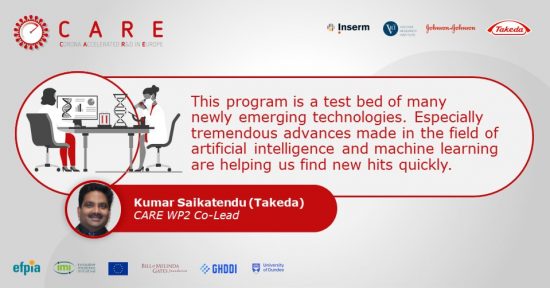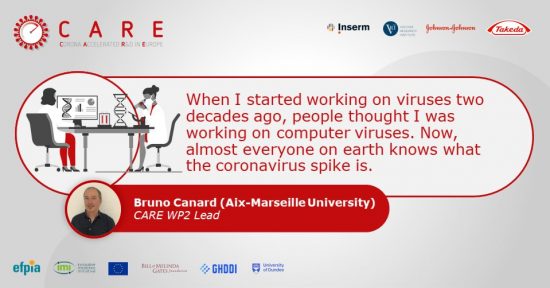January 10th 2022
The faces behind the CARE work-packages – WP2
The faces behind the CARE work-packages – WP2
CARE (Corona Accelerated R&D in Europe) is the largest European research initiative addressing the challenges of COVID-19. It is no surprise that it is designed in a comprehensive, yet agile, structure to fulfill the 37 partners’ shared key goals: (1) to identify therapeutics for the current pandemic, (2) to identify antiviral therapies for future outbreaks and (3) to increase the understanding of the pathophysiology of COVID-19. In a set-up of eight work-packages (WPs), the scientists and management at CARE carry out the project activities that have so far resulted in valuable learnings about COVID-19 and how it might be defeated.
In this monthly series, we go behind the scenes through brief interviews with the leadership of each of the eight CARE work-packages to hear insights on what makes their work so special, as well as their challenges and hopes.


WP2 – Target-based drug discovery and design
The CARE work-package 2 (WP2) is tasked with the identification of novel small molecule therapeutic candidates against the current the SARS-CoV-2 virus by conducting target-based drug discovery and design. The leads of WP2, Bruno Canard (Aix-Marseille University) and Kumar Saikatendu (Takeda) provided us in a short interview with insights into this research area, and talked about focal points, projects, challenges, and wishes for the future.
WP2 focuses on experimental target-based and in silico artificial intelligence (AI)-based screening and profiling of potentially novel compounds against SARS-CoV-2. What is special about this approach?
Kumar: This program is a test bed of many newly emerging technologies. Especially tremendous advances made in the field of artificial intelligence and machine learning are helping us find new hits quickly. These are then being tested rapidly in actual assays within WP2
What are or were the biggest challenges within WP2? (and how did you overcome them?)
Bruno: There are technical challenges because protein purification is often unpredictable and sometimes resemble to an art: although you design and follow protocols, the devil is in the detail. Sometimes a single amino-acid change in a protein alters a well-defined process. The skills, experience, and intuition of our technicians and engineers are key, and they play an essential role inside the project. Their work facilitated the transmission, exchange, and discussion of ideas inside the consortium. The second challenge is to make all these different corporate and academic partners work together, with the common goal of advancing science and solutions to control the pandemic. It takes a lot of administrative effort to coordinate such a huge and diverse effort. I am grateful to our restless scientific and administrative managers for addressing so many complicated yet essential issues. Overcoming these challenges is a relentless effort made of discussions, interactions, meetings and finding the right balance to be physically present and available in the lab. During the intense fight against COVID, collaborations have turned into friendships and long-lasting relationships for future research.
What are important interfaces with the other CARE work-packages?
Kumar: The main interfaces are both upstream and downstream of WP2. Validated hits emerging from WP2 need to be further profiled upstream in the WP1 virology assays and get initial data on SARS-CoV-2 neutralization. Secondly, downstream in WP3, the medicinal chemistry teams are well prepared to optimize these hits into potent inhibitors. This integration of WP1, 2 and 3 is of paramount importance to the success of IMI-CARE.
What are your expectations and wishes for the future?
Bruno: Part of my expectations are already fulfilled: Awareness of the need for a scientific preparedness towards emerging viruses will never be the same. What has been achieved up to now is truly remarkable in terms of knowledge, speed, and conquest of public opinion. When I started working on viruses two decades ago, people thought I was working on computer viruses. Now, almost everyone on earth knows what the coronavirus spike is. Education of the general public has made an incredible leap forward, and I believe that they understand that the present crisis is also an opportunity to implement better sustainable practices on our planet, as well as be better prepared to react efficiently and promptly to pandemics. The role of science and its interconnection between academia and industry is increasingly considered vital. The general public is also learning the difference between research, with its debates and conflicts, and its consensus product, science. My wish is that IMI-CARE will further contribute to these positive evolutions of our societies.
